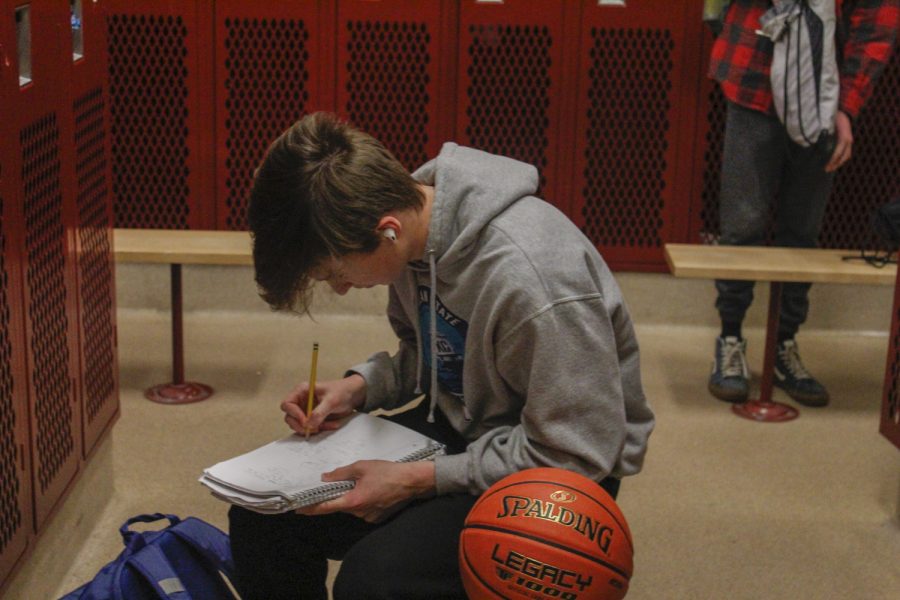Coaches help student-athletes conquer stress
Sophomore Jonah Gould works on his homework in the locker room before his meet on Dec. 21.
January 18, 2023
As student-athletes struggle with stress and mental health, coaches work to support their teams and create fun environments where students find joy in competing.
While all students face academic and social pressures during school hours, student-athletes add at least two hours to each school day and many weekends, too, with practices and competitions. The pressure to perform well can build up as long seasons progress. Many ARHS coaches keep their players’ stress in mind and find ways to help them cope while having fun.
“You’ve got kids that are not only anxious about their friends and their social circles, but they’re being asked to do so much in school,” girls’ varsity soccer coach and English teacher John Frederick said.
According to the National Federation of State High School Associations (NFHS), 31.9% of all high school student-athletes possess some sort of anxiety disorder, with 8.3% of them suffering severe impairments. The issue of mental health is more talked about than ever in connection with high school, college and professional sports. Likewise, there will be an event, “Supporting Athletes’ Mental Health: A Team Effort,” after school on Feb. 9 to discuss ways to support athletes.
Frederick and other coaches acknowledge their athletes’ struggles and work hard to support their players by embracing the core values and life lessons sports have to offer.
“Everyone has a bad day, everyone goes through it at different times, and the ability to put your team first, whether it’s a student or a coach, it’s very important,” three-sport coach and health and fitness teacher Kristen Morcone said.
Coaches who are teachers and were student-athletes themselves like Morcone, Frederick and Jon Cahill, who played football at ARHS and is a member of the football and baseball coaching staff, understand how a long season and the pressures of school work can impact athletes.
“At the beginning of a season, there is a lot of excitement,” Cahill said. “Then as the season goes on things start to slow down, the energy level goes down, and that could be a result of school work increasing.”
Cahill appreciates the efforts student-athletes put in after long school days.
“For some sports, you go right after school, then you get home and eat dinner, then you’ve got to go do school work for a few hours,” Cahill said.
With the stress of school, life and sports, it may be hard to find ways to relax. According to TeensHealth, changing the way you look at a scenario or problem into something more positive and relaxing, while practicing mindfulness can help reshape a person’s emotions and ways of thinking.
“I also think music helps a lot, playlists and stuff,” Morcone said. “It’s a good time to be silly and be a kid again.”
Frederick has learned from his experience as a student-athlete what was not discussed in the past when he was a student, and focuses more on providing a fun environment for his athletes.
“When I was here, mental health, mental well being, mental illness; these were not terms that were thrown around or really used,” Frederick said.
Morcone has a similar philosophy when coaching girls’ softball, basketball and volleyball.
“I just constantly remind [my students] that high school is a time you have to enjoy,” Morcone said. “It goes by far too quickly.”
Above all, coaches want athletes to remember that participating in sports should be fun and release more stress than they cause.
“The basketball court, the hockey rink, the soccer field, wherever it may be, needs to be a place of release and joy,” Frederick said.











